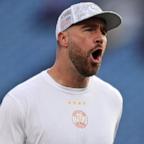
Iowa’s winnowing potential
There's been a lot of talk about whether any candidates will have an unexpectedly strong showing tonight and make the race more competitive. But these early contests usually play a different role: winnowing. Candidates who make it this far tend to hold out for a few more bites at the apple, with Super Tuesday marking a big winnowing moment. But there are always candidates who are depending on a strong showing in Iowa to save their candidacies, sometimes for geographic or ideological reasons. And these candidates sometimes treat Iowa as their cue to exit.
In 2016, Martin O'Malley left the Democratic race after results in Iowa confirmed that he wasn't much of a contender next to Hillary Clinton and Bernie Sanders. Republican Mike Huckabee also dropped out in 2016 after a disappointing performance, especially compared to his 2008 strength in the evangelical stronghold. In 2012, Minnesota Republican Michele Bachmann ended her campaign after coming in sixth — damaged not only by Iowa's critical role for lesser-known candidates, but also by the presumption that, because of the similarities with her neighboring home state, Iowa should have been friendly territory. In 2008, the Iowa caucuses seemed like they should have been a strong area for Democrat John Edwards, who campaigned extensively there with an economic populist message. But he came in second to Barack Obama, whose campaign presented the victory as a major statement about his broader electoral appeal, and stayed in the race for just a few more weeks. And then there was the famous "Dean scream" the night of the 2004 Democratic caucuses, after Howard Dean's Iowa support failed to live up to the excitement around his candidacy. This might not have doomed his presidential bid right away — he left the race after finishing third in Wisconsin — but it probably didn't help.







